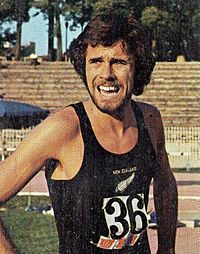Rod Dixon facts for kids
 Rod Dixon in 1976 |
||
| Medal record | ||
|---|---|---|
| Men's Athletics | ||
| Representing |
||
| Olympic Games | ||
| Bronze | 1972 Munich | 1500 metres |
Rodney Phillip Dixon, born on July 13, 1950, is a famous runner from New Zealand. He was amazing at both middle-distance (like 1500 meters) and long-distance races (like marathons). Rod won a bronze medal at the 1972 Olympics in Munich. He also famously won the New York City Marathon in 1983.
Contents
Rod Dixon's Running Journey
Rod Dixon was born in Nelson, New Zealand. He started his amazing running career by representing New Zealand at the 1972 Summer Olympics in Munich. There, he earned a bronze medal in the 1500 meters race.
Early Achievements and Records
After the Olympics, Rod continued to shine. He won his first British AAA Championships title in the 1500m in 1973. At the 1974 British Commonwealth Games in Christchurch, he finished fourth in the 1500 meters. His time of 3:33.89 was one of the fastest ever recorded at that time.
Rod then started running longer races, moving up to the 5000 metres. In 1975, he was ranked the number one 5000m runner in the world by Track & Field News magazine.
Olympic Challenges
At the 1976 Summer Olympics in Montreal, Rod competed in the 5000 meters. He finished fourth, just missing out on another Olympic medal. He was very close to getting a bronze, but another runner, Klaus-Peter Hildenbrand, made a last-second dive to cross the finish line just ahead of him.
Road Racing Success
Rod missed the 1980 Summer Olympics because New Zealand joined a boycott. This meant many athletes from different countries did not go to the Games. This was a difficult time for Rod. He felt that athletes should have been part of the decision. This led him to move to the United States to compete in road races.
He became very successful in road running during the early 1980s. He won several big races, including:
- The Falmouth Road Race (1980)
- The Bay to Breakers race (1982 & 1983)
- The Lynchburg, Virginia 10 miler (1981 & 1983)
- The Philadelphia Half-Marathon (1980, 1981)
His biggest win came in 1983 when he won the famous New York City Marathon. This was a huge achievement for him. He continued to compete, finishing 10th in the marathon at the 1984 Summer Olympics.
Life After Professional Running
Even after his competitive running career, Rod stayed involved in the sport. In 1985, he helped guide a blind runner in the Bay to Breakers race. He also helped with the New York Marathon by being the first person to wear a "Helmet Cam." This camera followed the lead runners for a mile, giving viewers a unique look at the race.
After winning the New York Marathon, an airline called Pan Am even put his name on one of their large 747 airplanes! They also gave him a special "self-write ticket" for first-class travel. He used to enjoy taking spontaneous trips with friends, like flying to Zurich for dinner.
Rod Dixon's Best Times
Here are some of Rod Dixon's personal best times in different running distances:
| Distance | Time | Place | Date |
|---|---|---|---|
| 800 m | 1:47.6 | Rome | 1973 |
| 1500 m | 3:33.89 | Christchurch | 1974 |
| 1 mile | 3:53.62 | Stockholm | 1975 |
| 3000m | 7:41.0 | Milan | 1974 |
| 3000 m Steeplechase | 8:29.0 | Oslo | 1973 |
| 2 miles | 8:14.4 | Stockholm | 1974 |
| 5000 m | 13:17.27 | Stockholm | 1976 |
| 10000 m | 28:11.0 | Atlanta | 1981 |
| Half marathon | 1:02:12 NR | Philadelphia | 1981 |
| Marathon | 2:08:59 | New York | 1983 |
Major Achievements
Here are some of Rod Dixon's most important achievements representing New Zealand:
| Year | Competition | Venue | Position | Event | Notes |
|---|---|---|---|---|---|
| Representing |
|||||
| 1972 | Olympic Games | Munich, West Germany | 3rd, Bronze Medal | 1500 metres | 3:37.5 |
| 1976 | Olympic Games | Montreal, Canada | 4th | 5000 metres | 13:25.50 |
| 1982 | 1982 IAAF World Cross Country Championships | Rome, Italy | 3rd, Bronze Medal | 11.978 km | 34:01 |
| 1984 | Olympic Games | Los Angeles, United States | 10th | Marathon | 2:12:57 |
See also
 In Spanish: Rod Dixon para niños
In Spanish: Rod Dixon para niños

